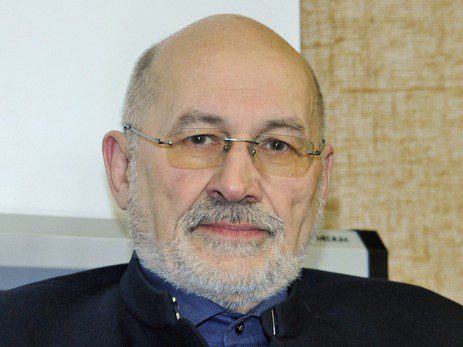STOP PRESS 15 May at 17.45 News has emerged in the past hour that Mahler has been arrested in Hungary and intends to ask Prime Minister Viktor Orbán for political asylum.
One of Germany’s most notorious Holocaust deniers, once loyal to leftist terrorist group RAF, has left the country despite having another jail term to serve, DW wrote on 20 April 2017. Horst Mahler says he wants to become an asylum seeker (see article below).
Last year Searchlight exposed a visit to the Nazi London Forum by Charles Krafft, a well known US artist. Krafft was once well admired until he became mentally and politically unhinged and started producing pro-Nazi “works of art”, some very vile. A planned exhibition of his work at an East London Gallery was rapidly cancelled after protests. Krafft had intended to sell or auction his Nazi pieces to raise money to support Mahler and spoke at a fundraising meeting the same month in aid of the same cause. Only a tiny amount of money was raised.
Krafft has now put his name down to attend an international Nazi rally in Oslo on 1 July. Searchlight is actively working with media colleagues in Norway and in Sweden, where another Nazi event is due to take place on 20 May.

DW wrote: Horst Mahler’s checkered career has taken another sharp turn. The 81-year-old neo-Nazi and Holocaust-denier has declared that he is on the run from the judiciary and is now thought to have fled the country.
In a video released on YouTube (and since removed) by the far-right affiliated network “Nordland TV,” the lawyer said he would not be following an order to serve his latest prison sentence, and would instead “ask for asylum in a sovereign state that is ready to accept people.”
He called the charges against him “political persecution without legal basis,” and accused Munich’s state prosecutor Manfred Nötzel of attempting to murder him in prison. An associate of Mahler’s told public broadcaster ARD that he was no longer in the country.
Mahler, one of Germany’s most prominent Reichsbürger (or “Reich citizens,” a loose movement that refuses to recognize the legitimacy of the modern Federal Republic) was sentenced to 10 years in prison in 2009 for repeated incitement to racial hatred and Holocaust denial.
He was released in August 2015 due to ill health (the lower part of his left leg was amputated as a result of an infection), but his sentence was extended for more offences committed while in prison. Further investigations are also pending – not least over the publication of an anti-Semitic book in the past few years. The Munich prosecutors’ office refused to comment on the video, which was apparently recorded on April 9, on the grounds that the investigations against Mahler are still ongoing.
A repeat offender
“For a long time, Mahler was the most famous Reichsbürger in Germany,” said Jan Rathje, a political scientist who specializes in tracking the far-right scene.
Mahler has persistently and publicly denied the Holocaust happened, which is a criminal offense in Germany that leads to long prison sentences for repeat offenders. Mahler is certainly unrepentant, having spent his 18 months of freedom frequently speaking at neo-Nazi rallies – in January, he appeared at an event in Ludwigshafen to deliver an address denying both the existence of gas chambers and the systematic murder of Jews during World War II.
But Mahler’s case is also unusual, since his political career began on the political far left in 1960s West Germany. As a lawyer, he represented many prominent leftist figures during the political unrest in the late 1960s and early 1970s, including Andreas Baader and Gudrun Ensslin, who later became terrorists in the group that Mahler helped to found: the Red Army Faction (RAF).
Mahler took part in some of the RAF’s criminal actions, including kidnappings and bank robberies, for which he was served most of the 1970s in prison. It was then that he read the works of 18th century philosopher Georg Wilhelm Friedrich Hegel, whose dialectic worldview is said to have influenced him since.
Consistent antisemitism
But, as Rathje pointed out, the path from violent extremism on the far-left to the far-right has been trodden by other prominent extremists, and in Mahler’s case was marked by his anti-Semitism.
“Already in the RAF there were anti-Semitic connotations,” Rathje told DW. “Mahler simply followed this path consistently and ended up on the far-right, as he was convinced there was an ultimate antithesis between the Germans and the Jews – on an ideological level he sees Germany as distinct from Judaism.”
By the late 1990s, Mahler had become prominent in the far-right scene, and joined the far-right nationalist National Democratic Party (NPD) in 2000. In a press statement released at the time, Mahler described the German constitution, or Basic Law, as a “provisional document for the transitional time before the re-establishment of the legal capacity of the German Reich.”
He represented the NPD in court when the government attempted to have it banned for being anti-constitutional in the early 2000s, but his fundamental opposition to the German state also led him to drop out of the NPD in 2003, on the grounds that its aim was to enter parliament, which meant that “like the parliamentary system itself,” as he said, “it was doomed to destruction.”
“He was always very active in various groups that denied the Holocaust,” said Rathje. “I don’t think he represents an actual danger, but he does consistently preach anti-Semitism in Germany. In the way he is always trying to make an issue of this, by bringing up his supposed evidence against the Holocaust, he thinks he can have some kind of cultural influence in the public discourse.”





